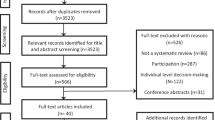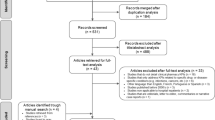Abstract
Access with evidence development (AED) describes the general approach of linking some form of access to the healthcare market with the generation of additional evidence relating to the value of the healthcare intervention under evaluation, with an explicit aim of aiding future decision making. A number of health systems around the world are interested in the potential for such schemes. This article looks in detail at the potential for some form of AED in the UK, focusing on the two major decision-making bodies: the Scottish Medicines Consortium in Scotland and the National Institute for Health and Clinical Excellence in England and Wales. We consider past experience with these approaches and current initiatives that are exploring their potential, and speculate as to how these schemes might develop in the future.


Similar content being viewed by others
References
McCabe CJ, Stafinski T, Edlin R, et al. Access with evidence development schemes: a framework for description and evaluation. Pharmacoeconomics 2010; 28 (2): 143–52
Tunis SR, Pearson SD. Coverage options for promising technologies: Medicare’s ‘coverage with evidence development’. Health Aff 2006; 25 (5): 1218–30
Pearson SD, Miller FG, Emanuel EJ. Medicare’s requirement for research participation as a condition of coverage: is it ethical? JAMA 2006; 296 (8): 989–91
Hutton J, Trueman P, Henshall C. Coverage with evidence development: an examination of conceptual and policy issues. Int J Technol Assess Health Care 2007; 23 (4): 425–35
Levin L, Goeree R, Sikich N, et al. Establishing a comprehensive continuum from an evidentiary base to policy development for health technologies: the Ontario experience. Int J Technol Assess Health Care 2007; 23 (3): 299–309
Scottish Medicines Consortium recommendation 256/06 [online]. Available from URL: http://www.scottishmedicines.org.uk/smc/4546.html [Accessed 2009 Nov 27]
Humbert M, Beasley R, Ayres J, et al. Benefits of omalizumab as add-on therapy for patients with severe persistent asthma who are inadequately controlled despite best available therapy (GINA 2002 step 4 treatment): INNOVATE. Allergy 2005; 60: 309–16
DeWilde S, Turk F, Tambour M, et al. The economic value of anti-IgE in severe persistent IgE medicated (allergic) asthma patients: adaptation of INNOVATE to Sweden. Curr Med Res Opin 2006; 22: 1765–76
Chalkidou K, Hoy A, Littlejohns P. Making a decision to wait for more evidence: when the National Institute for Health and Clinical Excellence recommends a technology only in the context of research. J R Soc Med 2007; 100: 453–60
Chalkidou K, Lord J, Fischer A, et al. Evidence-based decision making: when should we wait for more information? Health Aff 2008; 27: 1642–53
Chalmers I. Addressing uncertainties about the effects of treatments offered to NHS patients: whose responsibility? J R Soc Med 2007; 100: 440–1
National Institute for Health and Clinical Excellence. Proceedings of the NICE/AHRQ workhop on uncertainty. May 2008 [online]. Available from URL: http://www.nice.org.uk/aboutnice/howwework/researchanddevelopment/research_and_development.jsp?domedia=1&mid=A1ADF1EB-19B9-E0B5-D4ACC51AC0BBDBC9 [Accessed 2009 Nov 27]
NHS Quality Improvement Scotland. Coverage with evidence development in NHS Scotland [discussion paper], 2008 [online]. Available from URL: http://www.nhshealthquality.org/nhsqis/4948.html [Accessed 2009 Nov 27]
Garber AM, McClellan MB. Satisfaction guaranteed: “payment by results” for biologic agents. N Engl J Med 2007; 357 (16): 1575–7
Office of Fair Trading. The pharmaceutical price regulation scheme: an OFT market study. London: Office of Fair Trading, 2007
Claxton K, Briggs A, Buxton MJ, et al. Value based pricing for NHS drugs: an opportunity not to be missed? BMJ 2008; 336: 251–4
Pharmaceutical Price Regulation Scheme 2009 [online]. Available from URL: http://www.dh.gov.uk/pprs [Accessed 2009 Nov 27]
Scottish Government. Access to new medicines [press release; 25 March 2009; online]. Available from URL: http://www.scotland.gov.uk/News/Releases/2009/03/25164314 [Accessed 2009 Jun 23]
The Wellcome Trust/Medical Research Council/Economic and Social Science Research Council/Engineering and Physical Sciences Research Council. Report of an E-Health Initiative Workshop. 17 April 2009
Scottish Health Informatics Programme (SHIP) [online]. Available from URL: http://www.scot-ship.ac.uk [Accessed 2009 Dec 7]
Raftery J. Review of NICE’s recommendations, 1999–2005. BMJ 2006; 332: 1266–8
Darzi AV. Higher quality care for all: NHS next stage review final report. London: Department of Health, 2008
Acknowledgements
No specific source of funding was used to assist in the preparation of this article. A. Briggs holds the William R. Lindsay Chair in Health Policy and Economic Evaluation, and both A. Briggs and E. Fenwick are employed by the University of Glasgow; K. Ritchie is employed by NHS Quality Improvement Scotland; K. Chalkidou and P. Littlejohns are employed by the National Institute of Health and Clinical Excellence. The views expressed in this article are those of the authors and should not be attributed to the authors’ employing organizations. The authors have no conflicts of interest that are directly relevant to the content of this article.
Author information
Authors and Affiliations
Corresponding author
Rights and permissions
About this article
Cite this article
Briggs, A., Ritchie, K., Fenwick, E. et al. Access with Evidence Development in the UK. Pharmacoeconomics 28, 163–170 (2010). https://doi.org/10.2165/11531410-000000000-00000
Published:
Issue Date:
DOI: https://doi.org/10.2165/11531410-000000000-00000




